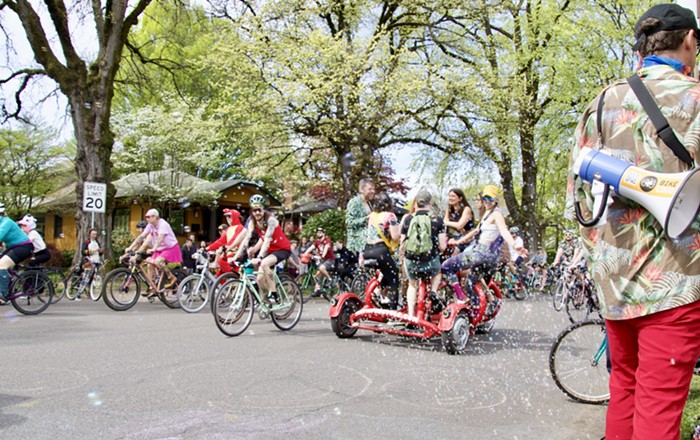The plan calls for installing 74 bike sharing stations across inner Portland for a Zipcar-like bike system that has a total startup cost of $4-4.5 million. Numerous other cities have similar systems, but here's a video from Minneapolis that paints a pretty good picture of what ours would look like.
With a city council that's all decidedly pro-bike the debate on the plan hinged on two issues: 1) Should the city invest in bike sharing when there's unmet basic safety needs throughout the city (relevant map of unimproved roads here)? and 2) What's going to be the public-private split on the cost of the program?
Commissioner Nick Fish countered the first issue with a last-minute amendment to the plan that promised the city would prioritize $1.25 million for passed-over projects—namely, improvements to SW Barbur and design of the Sullivan's Gulch trail—at some future date. It's a "have your cake and eat it too" idea, because the amendment didn't come with any real dollars attached, just a sworn commitment to fund those projects on some sunnier day. So nice words, but no money.
The amendment passed unanimously, but that didn't sway the vote of lone equity wolf Amanda Fritz, who, as expected, voted no on the whole plan.
"I unfortunately cannot vote for this," said Fritz, saying the city should prioritize funding infrastructure like sidewalks citywide before it caters to downtown students, tourists, and officeworkers who already have numerous transportation options. Fritz said she couldn't support the plan when, "I can't get off the bus a stop earlier than I usually would because there's no sidewalk. "
But, "As a reality check," she noted, "One mile of sidewalks on Capitol Highway costs $19 million to build."
Okay, now what about the cost? Minneapolis's bike share got started and remains running thanks to sponsorship from a Minnesota Blue Cross group. Portland's system would use something like that model, partnering the $2 million in federal startup funds with $2 million from local and private funds, including to-be-determined amount of cash from Regence Blue Cross Blue Shield of Oregon.
The system will cost an estimated $1.5 million to run every year and it's not determined yet at all who the ongoing private sponsorships of the program would work.
Commissioners Dan Saltzman and Randy Leonard were won over by that promise of private partnership—and the estimate that it will create 40-50 jobs.
Commissioner Saltzman voted to bike sharing but only with the caveat that all there be no public funding for operations of the program. "If the operations costs are not being shared through fees or private sponsorship, it tells me something is wrong with the model," said Saltzman.
One quick final note: PBOT said in the presentation that there has been no theft or vandalism problems with bike sharing systems in other cities. That's half true. Theft and vandalism hasn't been a problem at all in US bike sharing programs, 80 percent of the bikes in Paris's program were stolen or vandalized. Those rapscallions!
Here's what happens next: Metro votes on whether the three projects the city recommends actually should get the federal funding that's up for grabs (more info on that pot of money here). If bike sharing does get funded in the end, the stations should be operation in Portland by fall of 2013.















